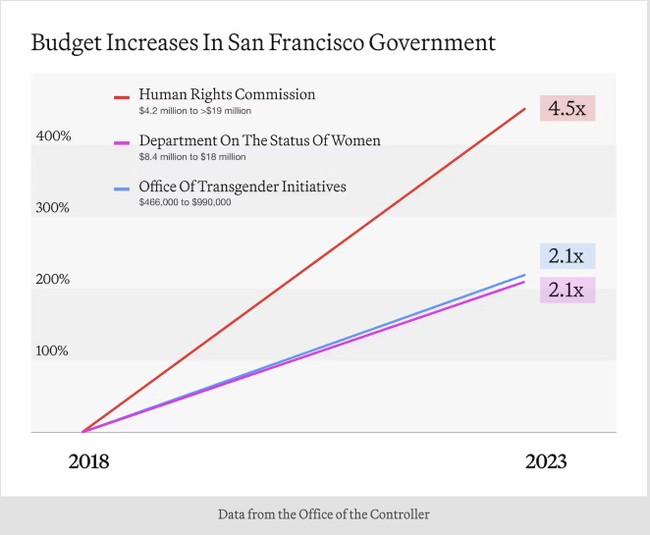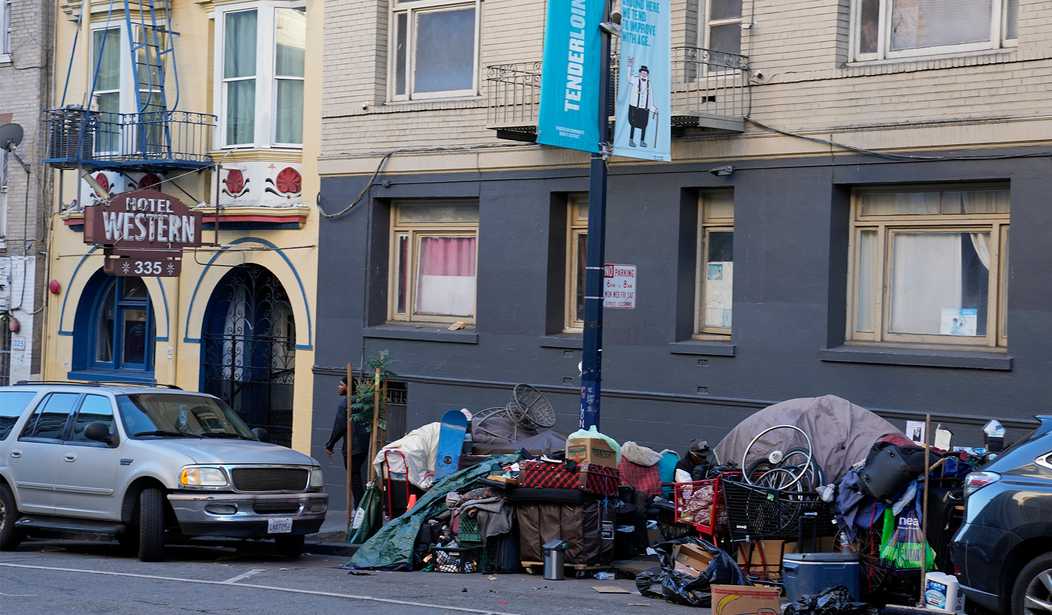Politicians SAY a lot of things; some they mean, some they don't.
So you should always look at what they do and how they spend the money they take from citizens. And, as importantly, whose pockets that money ends up in. The latter is even more important than the former.
There's a great article in a publication I had never heard of called Pirate Wires on just this topic: how the Mayor of San Francisco spends taxpayer dollars and with whom she spends it. It gives you great insight into how decisions are actually made by today's mayors, and will neither surprise you nor make you feel optimistic.
2/ Really good article. I think I disagree w/the idea that this has much to do w/"providing direct cash transfers to their target voter base," just b/c the raw number of people receiving money is so small and it seems funneled in a way that delinks it from Breed etc.?
— Jesse Singal (@jessesingal) February 9, 2024
What Sanjana Friedman, the author of said article found is about what you would expect: Mayor London Breed, who is facing an $800 million/yr deficit, has dramatically expanded her spending on DEI measures (to the tune of $100 million), and a good chunk of that money is finding its way into the pockets of political allies.
In December, San Francisco Mayor London Breed scrambled to cut costs across city departments in an attempt to close an exceptionally large budget deficit, which currently hovers around $800 million but could top $1 billion in a few years. In October, when the deficit was supposedly ‘only’ about $500 million, Breed sent a letter requesting city departments submit preliminary spend reduction proposals by the end of the month. “We need to ensure that every dollar our city departments spend, either directly, or through contracted parties, is done so responsibly and with accountability,” she wrote.
This is rich talk of fiscal responsibility from a mayor who's presided over record high city budgets from the start of her term in 2018 onward. The headline numbers of this spending spree are well known: a near-tripling of the Department of Homelessness and Supportive Housing’s budget, massive increases in spending on addiction-related services, and tens of millions in pandemic-era bailout programs, to name a few. But less discussed is the way Breed has quietly greenlit huge funding increases to a handful of activist-staffed city departments, including the Human Rights Commission (HRC), the Department on the Status of Women (DOSW), and the Office of Transgender Initiatives (OTI).
DEI is many things, but first and foremost it is a Left-wing scam to skim money off of government and corporate budgets and put it into the pockets of communist entrepreneurs.
At least they talk like and organize like communists, but as with all successful communists they wind up making bank themselves. Poverty for thee, wealth for me.

HRC’s Dream Keeper, which writes $200,000 checks to one-person “media companies” with almost no following and whose “Senior Home Repair Program,” funded by part of a $20 million grant, was recently found to have only repaired three homes since its inception two years ago, offers clear examples of wasteful, clientelist spending. But so too does the Office of Transgender Initiatives, which spends most of its budget on guaranteed income and rent payments offering a combined $3,200/month to around 150 “transgender and gender non-conforming people.” (Judicial Watch, a nonprofit, recently filed a lawsuit against the city on the grounds OTI's guaranteed income program violates the California Constitution's equal protection clause.)
More generally, we could say most of the money spent on these departments serves one of three interconnected purposes: (1) to provide work for activists tasked with either (2) distributing government funds to select client-constituents, incentivizing their ongoing political support or (3) manufacturing internally-directed identitarian propaganda to agitate for more government funds. We have come to call this nearly $100 million a year clientelism scheme — in which all involved actors are perversely incentivized to demand ever-increasing sums of money for themselves, and in which every dollar spent brings in more participants — San Francisco’s “DEI-industrial complex,” and outlined some of its most flagrant excesses below.
Now I can't argue that San Francisco doesn't have a human rights problem, but one of the major ways it manifests is the rapid increase in the waste of money on useless things like San Francisco's Human Rights Commission. Probably the biggest violation of human rights in the city has to do with budgets Mayor London Breed has cut, like arresting and prosecuting criminals.
You have to give credit to Breed's matching at least some of her rhetoric on DEI with her spending priorities, but then again her rhetoric doesn't include the minor detail that it is all a scam to funnel money to friends and allies.
Fixing 3 homes for $20 million is steep, even for San Francisco. But given that the city spends $60,000 or more for each homeless person in the city without reducing the number of homeless people, the waste is par for the course.
Actually, though, waste is the wrong term, because the "waste" is actually the point. Spending money not to fix problems ensures that you can spend even more money to not fix the problem next year, and the year after that.
The non-fixers are making bank off the backs of the people who actually need help. Toss some money to people because they are transgender and you have clients for life, just as the doctors have patients for life.
All three departments discussed in the introduction — the Human Rights Commission, the Office of Transgender Initiatives, and the Department on the Status of Women — have their own identity-specific welfare schemes. HRC’s operates indirectly through its subsidiary Dream Keeper Initiative, which in addition to providing “direct cash stipends” for “small or emerging Black-owned businesses,” also provides cash in the form of grants to tiny nonprofits like Clari-T Media, which got $200,000 from the program, or Both Sides of the Conversation, which got $300,000. On the other hand, OTI offers up to $3,200 a month to 145 “transgender and gender non-conforming people” through two stipend programs it runs directly:
- Guaranteed Income for Transgender People (GIFT), a program providing 55 “economically marginalized transgender people with unrestricted, monthly guaranteed income” of $1,200/month for a year-and-a-half.
- Our Trans Home SF, a housing and rental aid program for 90 “low-income transgender adults” that offers five-year subsidies of up to $2,000/month.
This year, DOSW plans to launch its own guaranteed income programs, which will offer monthly payments of unspecified amounts to “justice involved women” (e.g. those currently or formerly incarcerated) and “those from our Indigenous communities.”
Notice a pattern? Toss a bunch of money to friends, and then spend some money on reliable allies who will march, protest, organize, and ballot harvest to keep you in office.
It's hardly the case that patronage in politics is a new or shocking thing; it's just that as government has grown the scale of the graft has skyrocketed.
These cash transfer programs rely on steady inflows of taxpayer revenue, which the administrator-activists who staff these departments secure mainly by producing internally directed, identitarian propaganda. They are paid generously for this work; Sheryl Davis, who heads up HRC, made over $350,000 in combined salary and benefits in 2022; Kimberly Ellis, who runs DOSW, made around $280,000 in salary and benefits; and Pau Crego, who until recently ran OTI, made almost $200,000 — one-fifth of OTI’s total budget — in salary and benefits.
In general, these administrators oversee the production of either race- or gender-based propaganda directed at other city departments. HRC generally focuses on the former, largely through its subsidiary “Office of Racial Equity” (ORE), which Breed inaugurated in 2019 with an initial $600,000 investment, followed by an additional $4 million in 2020.
ORE’s stated mission is to “address structural and institutional racism in the City and County of San Francisco’s internal practices and systems and external delivery of services to the public.” To do this, it has tasked all other city departments with creating “Racial Equity Action Plans,” examining the racial composition of their workforces. ORE also has the authority to recommend “budget reductions [to other city departments] should [their racial equity] benchmarks not be met.” Every department in the city now has one of these “action plans” — from the Department of Elections, to the Planning Department, to San Francisco International Airport (SFO).
It used to be that allies got contracts to pick up the trash; these days checks are cut at scale, with no service returned for taxpayers.
I couldn't tell you what percent of "social service" spending is pure graft, but a huge percentage of the grants and programs exist solely to benefit the servicers, not the supposed clients.
That's why our major cities spend ungodly amounts of money to "help" people, but the "helped" never seem to benefit.
I call it "farming" the disadvantaged. Every homeless person, welfare recipient or drug addict is a resource that yields returns to the social services providers, whether government or nonprofit.
If they ever "solved" the problem they would be out of business.








Join the conversation as a VIP Member